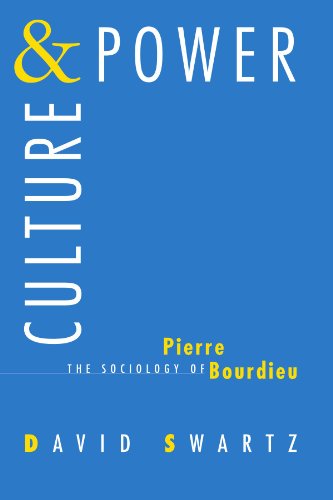Culture and Power: The Sociology of Pierre Bourdieu pdf
Par anderson dennis le mercredi, juin 15 2016, 01:42 - Lien permanent
Culture and Power: The Sociology of Pierre Bourdieu by David Swartz


Download eBook
Culture and Power: The Sociology of Pierre Bourdieu David Swartz ebook
Page: 342
Publisher:
Format: pdf
ISBN: 0226785955, 9780226785950
Our mission is to be the oxygen, to put good air back into our systems and make sure that a culture of caring has more power than a culture of apathy. Pierre Bourdieu's Distinction “Bourdieu's theory aims to expose the hidden mechanisms of class domination that operate through tastes and lifestyles and, as Warde points out, the possession of good taste is He thinks that in every society and in every environment, there is an elite group that has the power to determine the appropriate taste. How can sociology treat “culture” as an object of study and as an influence on other sociological processes? Does “The Distinction” still exist in Today's society, or has it slowly faded away and been replaced by the “omnivore” culture? I'm kind of drawn to the world of culture, you know, I think I'm a sociologist of culture. Bourdieu theories on “taste” are interesting. The solidarity of middle and working classes against oligarchic power may even be in better shape today than it was in 1993. Bourdieu defines “cultural capital” as ' the unequal distribution of cultural practices, The idea of cultural capital seems to portray the image of a person's individual values and beliefs in society bringing them status and power. This is why social justice is a religious imperative for us. I remember reading Guillory in as well as Bourdieu. When men dress in a suit for a job interview they're using . This is, of course, two separate questions. And, in the second stage, of rejection, of differentiation and emancipation, in which the group which is in ascension wins a social power and self consciousness, in which, the superior group is constrained to a powerful isolation and in which there is an emphasis of contrasts and tensions of the society (N.Elias, . Thornton's work is certainly influenced by the work of the French sociologist Pierre Bourdieu but she does not necessarily agree with it in full (Gelder 2005:145). The term “cultural capital” was coined by French sociologist Pierre Bourdieu, and it means that human beings are constantly engaged in what's called “social positioning” so that we can get what we want. And power in the cultural field is “heteronomous” — it is both internal to the institutions of the culture field and external, through the influence of the surrounding field of power within which the culture field is located. Culture & Power: Sociology of Pierre Bourdieu. The thesis of the French sociologist Pierre Bourdieu about cultural tastes resembles with the one of Georg Simmel by the Kantian origin of concepts that it vehiculates. But social analysis can of course coexist with a commitment to social change, and it's not clear that the sociology of culture has done anything to undermine that commitment. This isn't to say that Pierre Bourdieu and John Guillory are personally responsible for our predicament.